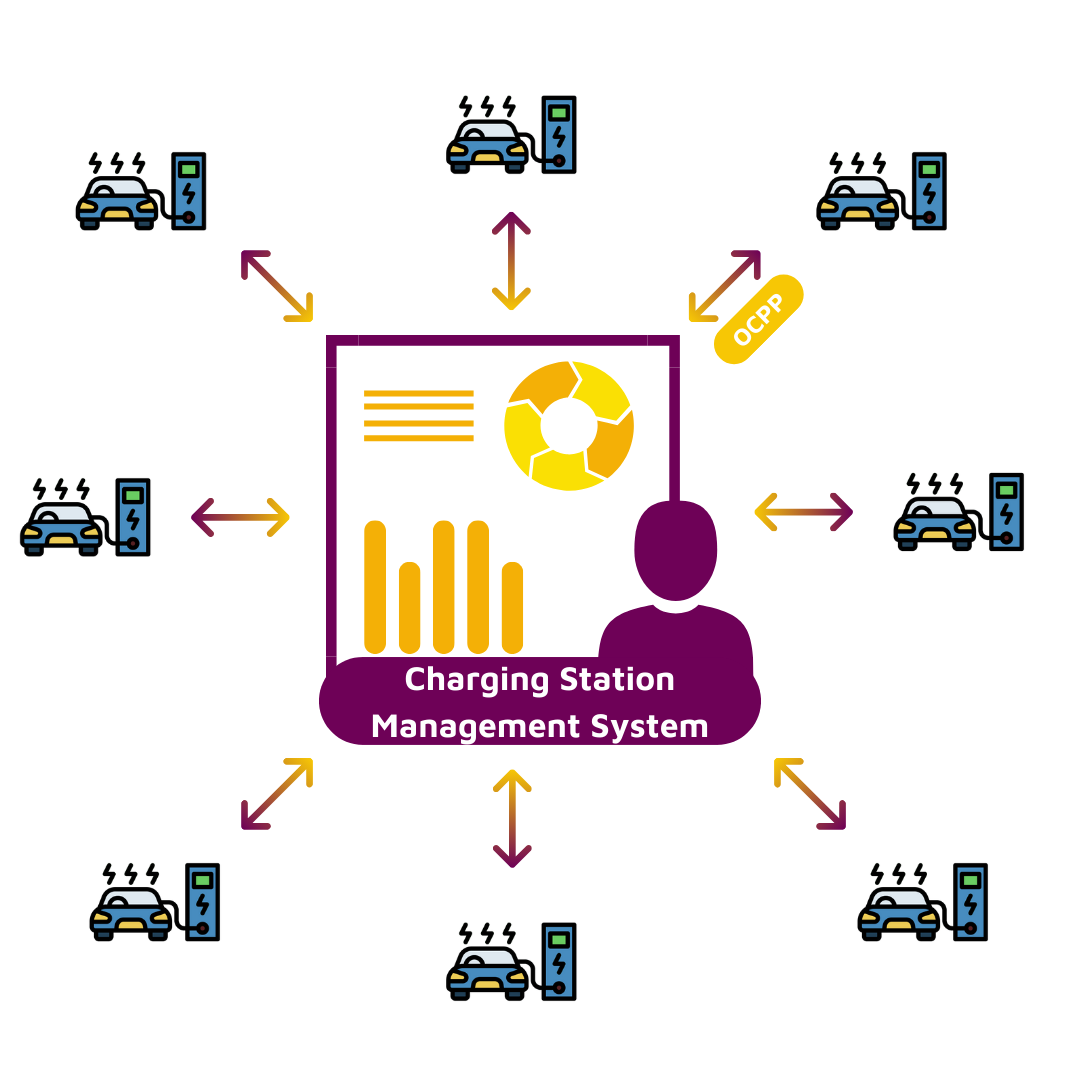Since its release in April 2020, OCPP 2.0.1 has gained significant attention as the latest version of the Open Charge Point Protocol (OCPP) maintained by the Open Charge Alliance (OCA). OCPP is the protocol responsible for handling communication between a charging station and its backend management, such as a charging station management system (CSMS). OCPP 2.0.1 introduces a wide range of improvements that promise to enhance device management, improve transaction handling, enable better Smart Charging capabilities, increase security measures to ensure safe and secure data exchange between charging stations and back-end management systems, and support ISO 15118, among other benefits.
With the growing interest in OCPP 2.0.1, demonstrated by the increasing number of participants at OCPP plugfests testing their OCPP 2.0.1 implementations, it is evident that this protocol is paving the way for a more seamless and sustainable e-mobility ecosystem. In this article, we will delve into the key features and benefits of OCPP 2.0.1 and explore how this protocol is shaping the future of the e-mobility industry.
Improved device management:
As the demand for electric vehicles (EVs) grows, so does the need for a charging infrastructure that can accommodate this increasing number of vehicles on the road. However, managing a complex environment with various types of charging stations, connectors, and operators can be challenging. This is where the new device model in OCPP 2.0.1 comes in. This latest version of the protocol enables Charging Station Operators (CSOs or sometimes known as Charge point operators CPOs) to easily and accurately track information about their charging stations. This feature represents a major advancement in charging station management, as it allows CSOs to programmatically configure their charging stations and gain detailed insight into the hardware and capabilities of each station. Armed with this information, CSOs can effectively manage and maintain their charging networks, while EV users can make informed decisions about where to charge their vehicles.
Flexible transaction management:
Transaction and cost handling can be a complicated matter, especially in the context of EV charging. One may wonder what they are paying for – only the energy consumed, the time parked in front of the charging station, a prepaid amount, or a combination of these factors. To address this issue, the latest OCPP protocol introduced a flexible transaction handling mechanism to accommodate various scenarios. This feature represents one of the most significant enhancements distinguishing OCPP 2.0.1 from its predecessor, OCPP 1.6.
With this new mechanism, CSOs can start or stop transactions at different points in time, such as when energy transfer begins, when an EV plugs into the charging station, or even when the EV drives into the charging station’s parking bay. This enhanced flexibility, coupled with improved device management, is essential for both EV users and CSOs, as it enables a more seamless experience with detailed payment and transaction information for all parties involved.
Improved security:
One important criticism of OCPP was its lack of security. However, with the release of OCPP 2.0.1, significant efforts were made to address this issue and enhance the security of the communication channel that handles critical information.
OCPP 2.0.1 introduces three distinct “security profiles” (1, 2, 3) to provide varying levels of security for websocket communication. The first profile still utilizes unsecured websocket communication but incorporates HTTP basic authentication to authenticate the client. While this solution is not perfect, it represents a notable improvement over OCPP 1.6.
The subsequent two security profiles offer substantial security enhancements. Both profiles employ Transport Layer Security (TLS) to encrypt the websocket communication, ensuring a secure websocket (wss). Security profile 2 relies on the server root certificate to secure the communication, while security profile 3 goes a step further by utilizing both the server root certificate and a client certificate specific to the charging station.
In addition to bolstering communication security, OCPP 2.0.1 introduces other noteworthy features such as secure firmware updates, security logging, and event notifications. These additional capabilities significantly enhance the overall security of the protocol.
Smart Charging:
The Smart Charging section of the OCPP protocol has undergone significant improvements in the latest version, OCPP 2.0.1. In addition to retaining the charging profile stacking capability from OCPP 1.6, OCPP 2.0.1 enhances the management of these profiles by providing clearer guidelines on how different profiles can be combined. This ensures better coordination and optimization of charging processes.
Moreover, OCPP 2.0.1 introduces improved integrations with the broader e-mobility ecosystem. Notably, it includes a new feature that enables the acceptance and reporting of external profiles. This allows for greater flexibility and compatibility with various charging infrastructure and third-party systems, enhancing interoperability.
These advancements in the Smart Charging section of OCPP 2.0.1 improve the protocol’s capabilities and offer a more versatile and integrated solution for managing and optimizing charging processes within the e-mobility ecosystem. This can help reduce the impact of EVs on the electrical grid and potentially even alleviate it. It also sets the foundation for seamless integration with other standards, such as ISO 15118, which further enhances the compatibility and interoperability of OCPP with electric vehicles and the charging infrastructure.
ISO 15118 Compatible:
One of the most notable updates in the OCPP protocol is the inclusion of native support for the ISO 15118 communication protocol. ISO 15118 plays a crucial role in facilitating communication between EVs and charging stations. This protocol has gained significant importance in the e-mobility industry, as it enables advanced technologies such as Plug&Charge, Smart Charging, and Vehicle-to-Grid (V2G) functionality.
By integrating ISO 15118 support, OCPP ensures a seamless and secure charging experience, leveraging the capabilities provided by this protocol. It enables features like Plug&Charge, which allows for automatic authentication and authorization between the EV and charging station, eliminating the need for manual intervention. Additionally, Smart Charging functionalities can be enhanced by leveraging ISO 15118’s bidirectional communication capabilities and advanced charging management.
In the upcoming release of OCPP 2.1, the support for ISO 15118 will be further expanded. This includes the addition of ISO 15118-20 support, in addition to the existing ISO 15118-2 support. The inclusion of ISO 15118-20 introduces enhanced features and functionalities, which will be beneficial for seamless integration and interoperability within the e-mobility ecosystem. Furthermore, OCPP 2.1 aims to provide more comprehensive support for bidirectional charging, allowing for efficient energy exchange between the EV and the grid.
Challenges of OCPP 2.0.1:
While these new features undoubtedly offer valuable enhancements, they introduce a certain level of complexity that can make the implementation and execution of this protocol a challenging endeavor. For instance, the introduction of various transaction start and stop points, as mentioned earlier, improves transaction management but can also lead to intricate scenarios and potential issues. Consider a scenario where the transaction starts at “EvConnected” and stops at “Authorization.” In this case, there’s a risk of encountering an infinite transaction scenario where a vehicle connects, never authorizes, disconnects, and departs, leaving the charging station stuck in an ongoing transaction state.
Another noteworthy improvement that comes with its own set of challenges is the enhanced device management. While the new device model defined in this protocol version provides valuable insights into charger behavior, it also introduces a high degree of customizability. This increased flexibility can result in significant implementation overhead. Depending on specific configuration settings, a charger may exhibit entirely different behaviors, making it necessary for charging station manufacturers and operators to thoroughly understand nearly all potential settings and configurations, as each combination can profoundly influence the charging station’s operational behavior. This intricate web of customization options can pose a substantial learning curve and demand meticulous attention to detail during the implementation and management of the protocol.
Trialog’s expertise:
Trialog recognizes the importance of OCPP and the critical role it plays in the development and deployment of EV charging infrastructure. OCPP has emerged as a widely accepted protocol for enabling communication between EV charging stations and management systems, promoting interoperability between different vendors and service providers. It is this realization that has driven Trialog’s deep involvement in the development of OCPP and our commitment to streamlining its implementation process. As active members of the Open Charge Alliance, we have made significant contributions to both the certification process and the validation of the OCPP Certification Testing Tool (OCTT). Collaborating with other industry leaders, we actively shape the future of EV charging infrastructure. Our participation in OCPP development has provided us with unparalleled expertise, enabling us to assist businesses in navigating the complexities of this rapidly evolving landscape.
To this end, we offer a comprehensive OCPP software stack for both Charging Stations (CS) and Charging Station Management Systems (CSMS), as well as on-demand training sessions on OCPP. Our software products for CSO and manufacturers are designed to help businesses easily integrate OCPP into their charging infrastructure, reducing development time and ensuring interoperability.
In addition to our software solutions, we offer two useful products designed to assist in validating and troubleshooting their OCPP implementations: EVSE ComboCS and OCPPvs (OCPP Virtual Stations). The EVSE ComboCS serves as a physical charging station simulator with integrated OCPP capability, ideal for businesses requiring a device that can communicate using both OCPP and ISO15118/DIN70121. On the other hand, OCPPvs is an innovative product that allows businesses to test their energy management systems by simulating numerous virtual EVs and charging stations. It can also be used for debugging and validating OCPP implementation against a virtual charging station and EV. OCPPvs provides businesses with a testing environment that closely mirrors real-world scenarios, enabling them to simulate and replicate various use cases effectively.
To learn more about our products and services, please visit our website.


